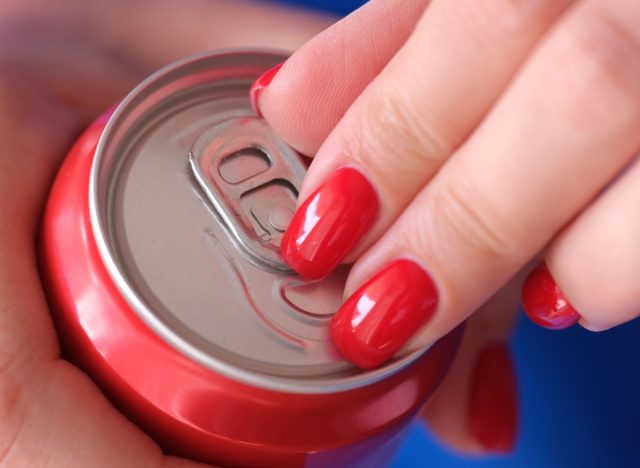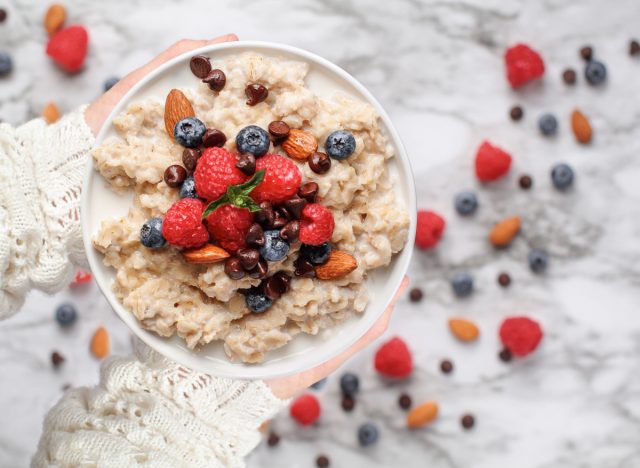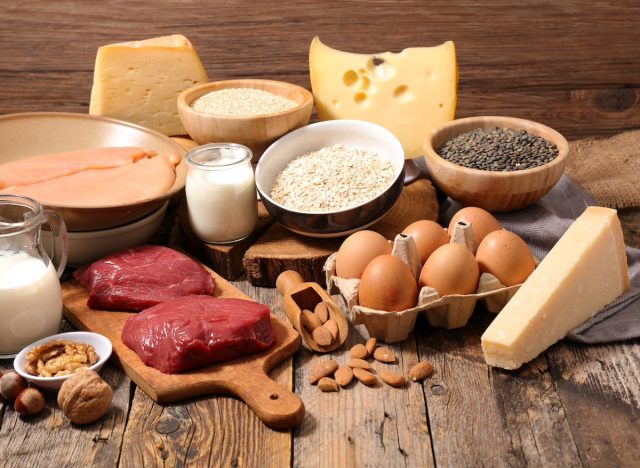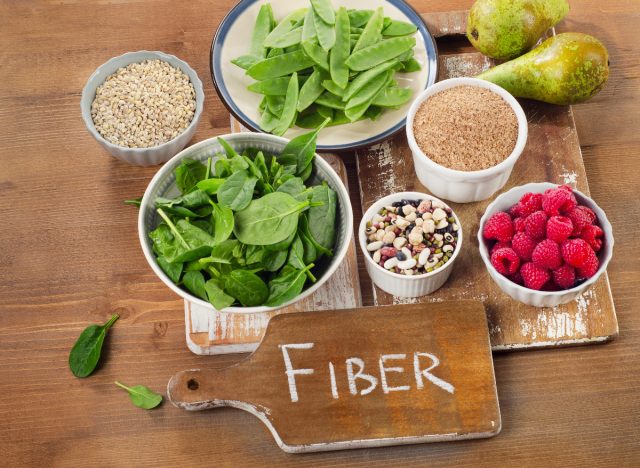10 Ways To Keep Menopausal Weight Gain at Bay

Weight gain during menopause may seem like an unavoidable downside of aging. But the good news is it doesn't have to be. We chatted with registered dietitians and nutrition experts who reveal the 10 best ways to keep menopausal weight gain at bay—all while boosting your health and energy levels.
As your body transitions through menopause, hormonal changes can increase body fat, particularly around the abdomen. According to a 2022 study, weight gain during menopause is often caused by reduced metabolism and lack of exercise. It is linked to a higher risk of cardiovascular disease, type 2 diabetes, and other health issues. Fortunately, by following these expert tips, you can confidently navigate menopause and maintain a healthy weight.
Understanding how to manage weight gain during menopause is crucial for physical and mental well-being. The hormonal shifts during this period can affect metabolism, muscle mass, and energy levels, making it more challenging to maintain a healthy weight. However, with the right strategies, you can counteract these changes and keep those extra pounds off during this significant life stage.
Keep reading for the best ways to keep menopausal weight gain at bay, according to registered dietitians.
Limit sugary beverages.

Replace calorie-packed sodas, sweetened teas, and energy drinks with water, herbal teas, or sparkling water with a splash of citrus.
Destini Moody, RDN, CSSD, LD, a registered dietitian and sports dietitian with Garage Gym Reviews, tells ETNT, "When menopausal, the body doesn't process carbs as they should. High-sugar beverages can cause one to consume a large amount of sugar in a very short period. This is detrimental because it causes a blood sugar spike and subsequent crash that can cause you to eat more calories. This situation is even worse because sugar beverages are also high in calories but have little nutritional value."
Incorporate resistance training.

Incorporating resistance training into your routine can build muscle mass, which research suggests can speed up your metabolism, helping you burn more calories even at rest.
"After age 30, your muscle mass starts to decline as a natural part of aging," Moody explains. "You can lose up to 8% of your muscle mass every decade after the age of 30, and menopause has been shown to accelerate this muscle loss even more quickly due to the natural decline in estrogen. However, the more muscle you have, the faster your metabolism is and the more calories you can burn at rest."
Eat more whole grains.

A 2022 review published in Food Science & Nutrition concluded that whole grains can help stabilize blood sugar levels and keep you feeling fuller for longer by digesting slower than refined grains. This can prevent overeating and support healthy weight management.
"Menopause comes with insulin resistance, which means your cells don't respond to insulin as they should," says Moody. "This results in the body being unable to send glucose from food where it should go, so it gets stored as fat instead. However, eating high-fiber whole grains like brown rice, oats, and whole-grain pasta can help your body better manage the incoming glucose. These sorts of grains digest more slowly as fiber reduces the speed at which the carbohydrates are released into the bloodstream as glucose, which gives the body more time to process it properly and reduce the odds of the calories ending up as fat tissue."
Get enough sleep.

It's no secret that regular quality sleep is essential for staying healthy. Lack of sleep has been associated with weight gain, increased obesity risk, reduced metabolism, and chronic disease risk.
Moody tells us, "The combination of sleep deprivation and altered estrogen levels that come with menopause can change the way the body burns fat, which can result in weight gain. Sleeping about seven to eight hours per night can go a long way in helping your body better utilize body fat in a way that makes it easier to manage weight."
Reduce stress levels.

Chronic stress increases cortisol levels, which can lead to weight gain, especially around the abdomen.
Gianna Masi, CPT, RDN, a certified personal trainer and registered dietitian with Barbend, explains, "When too much cortisol is produced, your body has a more difficult time burning calories. Pair this hormonal disruption with the menopausal hormones that are already working against you in the weight department, and you're fighting an uphill battle."
Masi recommends finding non-diet-related ways to relax and reduce stress, such as meditation, breathing exercises, yoga, and activities you enjoy.
Increase your N.E.A.T.

N.E.A.T. stands for non-exercise activity thermogenesis, which encompasses all the calories you burn through daily activities that aren't considered formal exercise, such as walking, moving, and performing chores.
"Research has shown that increasing N.E.A.T. can significantly boost daily calorie expenditure, helping to manage weight gain during menopause," explains Masi. "To increase your N.E.A.T., incorporate more movement into your daily routine. Take the stairs instead of the elevator, park further from your destination, or stand and stretch regularly if you have a desk job. These small changes can add up and make a big difference in managing menopausal weight gain."
Boost your protein intake.

"Protein is essential for maintaining muscle mass, which tends to decrease with age and during menopause," says Masi. "Consuming adequate protein alongside resistance training can help preserve lean muscle tissue, which is metabolically active and aids in burning calories. Additionally, protein has a higher thermic effect than fats and carbohydrates, meaning the body takes more energy and burns more calories digesting protein."
Aim to include a source of protein with every meal, such as lean meats, fish, eggs, dairy, beans, tofu, or legumes. This can help you feel fuller for longer, reducing the likelihood of overeating and helping to manage weight gain during menopause.
Eat more fiber.

Fiber promotes digestive health and helps you feel satisfied longer, reducing your odds of overeating or snacking mindlessly.
Masi says, "High-fiber foods can help you eat less and stay satisfied longer, making it easier to manage weight during menopause. Incorporate fiber-rich foods such as fruits, vegetables, whole grains, and legumes into your diet. Consume at least 25 grams of fiber per day. This supports weight management, benefits heart health, and reduces the risk of certain diseases."
Limit alcohol.

Masi recommends limiting alcohol to moderate consumption or only drinking it on special occasions.
"Alcohol can contribute to weight gain due to its high-calorie content and its tendency to lower inhibitions, leading to overeating or making poor food choices," Masi explains. "During menopause, building and maintaining lean muscle mass becomes even more important, and alcohol can inhibit your recovery and ability to gain muscle."
Stay consistent with meal timing.

Stay consistent with your meal timing by eating three balanced meals and one or two healthy snacks daily.
"Eating at regular intervals helps maintain stable blood sugar levels, which can be beneficial during menopause when hormonal changes can affect metabolism and appetite," says Masi. "Consistent meal timing prevents overeating and helps manage hunger cues effectively. Avoid skipping meals, as this can lead to overeating later. Regular meal timing supports your metabolism and can aid in managing weight gain during menopause."
- Source: https://www.ncbi.nlm.nih.gov/pmc/articles/PMC5509974/
- Source: https://www.ncbi.nlm.nih.gov/pmc/articles/PMC10074318/
- Source: https://www.ncbi.nlm.nih.gov/pmc/articles/PMC7090295/
- Source: https://www.ncbi.nlm.nih.gov/pmc/articles/PMC9179146/
- Source: https://www.ncbi.nlm.nih.gov/pmc/articles/PMC9031614/
- Source: https://www.ncbi.nlm.nih.gov/pmc/articles/PMC5958156/
- Source: https://www.ncbi.nlm.nih.gov/pmc/articles/PMC6058072/
- Source: https://www.acsm.org/docs/default-source/files-for-resource-library/protein-intake-for-optimal-muscle-maintenance.pdf
- Source: https://pubmed.ncbi.nlm.nih.gov/23885994/









